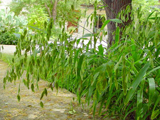Native Plants

Q. Who is Mr. Smarty Plants?
A: There are those who suspect Wildflower Center volunteers are the culpable and capable culprits. Yet, others think staff members play some, albeit small, role. You can torture us with your plant questions, but we will never reveal the Green Guru's secret identity.
Did you know you can access the Native Plant Information Network with your web-enabled smartphone?
Ask Mr. Smarty Plants is a free service provided by the staff and volunteers at the Lady Bird Johnson Wildflower Center.

rate this answer
Wednesday - February 18, 2015
From: Charlotte, NC
Region: Southeast
Topic: Erosion Control, Grasses or Grass-like, Herbs/Forbs, Shrubs
Title: Native border plants to stop erosion
Answered by: Nan Hampton
QUESTION:
I need native border plants to assist in stopping soil erosion due to water run off from rain and the Catawba River.ANSWER:
A good way to find plants that would do well for border plants is to visit our North Carolina Recommended list which gives commercially available plants that are known to do well in North Carolina. In the sidebar on that page there are choices you can make to NARROW YOUR SEARCH. Since I don't know whether you are looking for woody plants (shrubs) or herbaceous plants or the amount of sunlight the area receives, I didn't use any of the criteria to limit the search. I did find a combination of shrubs and herbaceous perennials that you might consider. They are:
Ceanothus americanus (New jersey tea)
Cephalanthus occidentalis (Common buttonbush) can grow to a large bush or small tree but it does very well holding the soil at the edge of ponds and streams.
Conoclinium coelestinum (Blue mistflower)
Hypericum prolificum (Shrubby st. johnswort)
There are more to be considered so you should try the search yourself.
That list does not include any grasses or grasslike species. Grasses are very good plants to help prevent erosion since they have extensive fibrous root systems that can hold the soil in place. Most grasses do best in full sun, but there are also some that do well in part or full shade. Most sedges do well in part shade and shade. All of the grasses and sedges below are shown by the USDA Plants Database to occur in or very near Mecklenberg County in North Carolina.
Grasses
Andropogon gerardii (Big bluestem) grows in sun and part shade.
Andropogon glomeratus (Bushy bluestem) grows in full sun.
Chasmanthium latifolium (Inland sea oats) grows in sun, part shade and full shade.
Muhlenbergia capillaris (Gulf muhly) grows in full sun.
Panicum virgatum (Switchgrass) grows in sun and part shade.
Schizachyrium scoparium (Little bluestem) grows in sun and part shade.
Sorghastrum nutans (Indiangrass) grows in sun, part shade and shade.
Sedges
Carex blanda (Eastern woodland sedge) grows in sun, part shade and shade.
Carex pensylvanica (Pennsylvania sedge) grows in sun, part shade and shade.
Carex texensis (Texas sedge) grows in sun and part shade.
Below are photos from our Image Gallery of some of the suggestions listed above.
From the Image Gallery
More Erosion Control Questions
Deer Resistance and Erosion Control for St. Louis County MO
January 03, 2014 - I am looking for deer and rabbit resistant native plants for erosion control on a steep ravine slope with part sun and part shade in St. Louis County MO.
view the full question and answer
Native plants to stabilize a steep bank in Pennsylvania
April 23, 2008 - I would like to use native plantings to stabilize a steep bank of a septic leach field in eastern Pennsylvania. My purpose is to control erosion and to eliminate the need for mowing. What would you r...
view the full question and answer
Plants for a bank too steep to mow
June 24, 2009 - Like the inquiry made in late June of 2008, mine involves a bank that is too steep to mow. However, ours is facing south. I am looking for a native grass, plant or groundcover. Any suggestions?
...
view the full question and answer
Exposed Tree Roots in Austin
September 04, 2012 - I have a large ash tree with a lot of mud at the top of a sloping yard. I want to build a small retaining wall with the ground leveled above. This would entail covering exposed tree roots with 4-18 in...
view the full question and answer
Raised beds over lateral lines in Solgohachia AR
January 02, 2010 - I would like to build raised flower beds over my lateral lines. They would be planted with strawberries and perennials. Will this cause any problems with the absorption into the ground or not lettin...
view the full question and answer
| Support the Wildflower Center by Donating Online or Becoming a Member today. |

